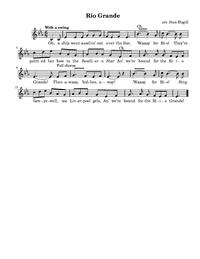Rio Grande

“Rio Grande” is a sea chantey.
Alternate names
- Away, Rio
- Away for Rio
- Bound for the Rio Grande
External links
- “Rio Grande” at The Digital Tradition on the Mudcat Café
- “Rio Grande” discussion on the Mudcat Café
- “Rio Grande” at MusicBrainz
Liner Notes
“Rio Grande” is track 1 on Shower Chanteys.
“Rio Grande” is a capstan or windlass chantey, exclusively used for raising the anchor on an outward-bound trip. I first learned this song at the San Francisco chantey sing; my version is fairly close to that of Salty Walt and the Rattlin’ Ratlines.
According to Hugill[1], the place in question is Rio Grande do Sul, in Brazil, though his assertions should always be taken with a grain of salt. All the sources[2][3] and all recordings I’ve ever heard badly mispronounce the place, as I do as well; it is always Rye-o Grand, never Ree-o Grahn-day. Sailors were generally abominable about furrin place names.
Hugill gives six variations; the first is transcribed in the first page of the PDF linked here, as I was messing about with the LilyPond software I used to put the arrangement together.
The first version that I recorded can be heard in the Kickstarter campaign video. It was a little tricky getting pitches right; Jim Prendergast, my recording engineer, suggested making MIDI guidetracks, which is what led to this whole songbook and online liner notes project as a side-effect. I had a cold while I was arranging this song, and originally arranged it in F, then F♯, then G, all of which are way out of my normal range. I believe I ended up recording it in A♭, still a touch below my normal range, for our second take, which sounded much more solid, and is what’s on the album.
References
- ↑ Stan Hugill. Shanties from the Seven Seas, pp. 80–87. New U.S. Edition. Mystic, Conn.: Mystic Seaport, 1994.
- ↑ Joanna C. Colcord. Songs of American Sailormen, pp. 85–87. Enlarged and Revised Edition. New York: Bramhall House, 1938.
- ↑ Laura Alexandrine Smith. The Music of the Waters, pp. 10–12. London: Kegan Paul, Trench & Co., 1888.